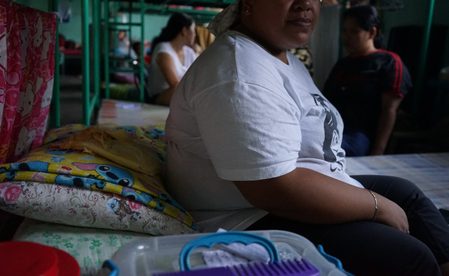SUMMARY
This is AI generated summarization, which may have errors. For context, always refer to the full article.

This story is part of COVID-19 Pushed Me to Leave the Philippines, a series of profiles of Filipinos who migrated out of the country during the pandemic.
For domestic helper Ging*, the days in Jeddah, Saudi Arabia, are mostly a predictable cycle. She gets up before 6 am and prepares coffee for her employer, an imam at a mosque. While the imam’s toddler is still asleep, Ging sweeps the living room and patio. She also cleans the bedrooms, “but only once a week,” the imam’s wife tells her, “because you need to look after my son.”
This is how Ging imagines the next two years, with no days off, and no guaranteed vacations while her contract is ongoing. While the couple’s two-year-old stays under her watchful eye, she talks to her 20-year-old daughter through a screen.
When the COVID-19 pandemic affected her family’s livelihood in her home province of Bulacan, Ging joined the thousands of Filipino domestic workers deployed around the world. To her, this was key to securing her daughter’s future, who dreamed of continuing her education.
Data from the Philippine Overseas Employment Administration show that from 2016 to 2019, more than half of female overseas Filipino workers (OFWs) were in elementary occupations, which included domestic work.
GCTA returnee
Ging, an ex-convict, was determined to make up for the 11 years she spent away from her daughter.
The 39-year-old started her application to go abroad in 2018, two years after she completed her sentence at a correctional for women in the Philippines. This was a months-long process of gathering requirements – suspended because of a controversial order by President Rodrigo Duterte.
In September 2019, Duterte ordered almost 2,000 heinous crime convicts already released through good conduct time allowance to surrender again to the government, or be considered fugitives from the law. This came at the height of the controversy involving rape-slay convict, former Calauan mayor Antonio Sanchez, who was almost released via GCTA.
Ging, though not a heinous crime convict, went back to the Correctional Institute for Women (CIW) just to make sure she wouldn’t run into problems in her migration process. She was released through GCTA on her charge of qualified theft.
“Parang nara-rattle ako. Baka magkaroon ng problema sa papers ko. Hassle din ‘yun sa akin eh. Kaya ako bumalik ng CIW, gusto ko rin ma-clear kung talagang may problema ba ‘yung papers ko o wala,” she said.
(I was rattled because I might encounter problems with my papers. It was a hassle for me. I went back to CIW because I wanted to clarify if there were problems with my papers or none.)
Duterte promised not to send returnees back to prison if they surrendered in good faith. But because the justice department needed to confirm Ging was rightfully released, she was made to stay along with many other ex-cons terrified by Duterte’s shoot-to-kill order.
It took four months before Ging was released from jail again, only to be told that her papers were clean after all. She said she wasn’t compensated for being kept those months away that she could have been supporting her teenage child.
But these were secondary concerns. On top of Ging’s mind upon release was the sheer, long-awaited joy of being truly free.
“Sobrang saya ko kasi alam ko sarili ko na cleared na ako, so puwede ko nang ituloy ‘yung panibagong buhay na tatahakin ko. Kung ano man ‘yung nasa labas, kailangang harapin. Masaya akong makakasama ko na ‘yung pamilya ko that time,” she said.
(I was so happy because now I was certain I had been cleared. I could finally continue the new path I was set to tread. I needed to face whatever was out there. I was happy to finally be with my family at that time.)
A second try
Ging resumed her normal life in January 2020. She and her partner Xandra* worked in a meat shop owned by Xandra’s aunt.
Suddenly, the novel coronavirus came to the Philippines. The government put the whole of Luzon on hard lockdown in March, disrupting their lives in Bulacan.
Many livelihoods were drastically affected, but because selling food was an essential service, Ging and Xandra carried on as usual. However, the normalcy in their business only lasted for so long.
“Noong unang bugso ng pandemic, mabili ‘yung meat shop namin. Siguro kasi marami pang ipon ‘yung mga tao, ‘di ba? Saka marami pa silang ayuda,” she said. (When the pandemic first surged, our meat shop was profitable. Maybe it was because people still had savings, and there was plenty of cash aid.)
After around four months, sales went down. Perhaps people began saving their money again, Ging thought, because it was no longer clear when the pandemic would end.
Meanwhile, Ging’s daughter Princess* tried finding work at a tailoring shop and a resort. However, the erratic lockdown situation made it difficult for Princess to find stable income. Since graduating senior high school right before the pandemic, she did not continue school, even if she wanted to.
“Hindi siya nag-enroll noong pandemic kasi ayaw kasi niya ng online. Nahihirapan daw kasi siya ‘pag online,” said Ging of her daughter. (She didn’t enroll during the pandemic because she didn’t want online schooling. She finds it difficult.)
As sales at the meat shop went down, Ging and Xandra’s shifts were halved. Each of them earned P150 a day from the pre-pandemic P250.
Their combined monthly salary of around P9,000 was barely enough to cover household expenses, much less a college education. But Princess had dreams of getting a degree in marketing.
“May utak din kasi ‘yun eh, kaya sayang kung hindi pag-aralin. Gusto ko rin talaga siyang ipursige na mag-aral, kasi para din naman ‘yun sa kanya eh,” said Ging. (She’s got brains, and it would be a waste if I didn’t get her to study. I really want her to continue her studies, because it’s for her benefit too.)
And so Ging reapplied to work as a domestic helper abroad through a recruitment agency in October 2021. Because she had experience from before, gathering the requirements was not as difficult as the first time. The migration expenses were minimal as well since her employer shouldered some of these.
Ging was approved to fly to Jeddah on December 15. The week after saw her first virtual Christmas with her family.
‘Gusto kong makatapos anak ko’
Saudi Arabia is not wanting in cases of abuse involving OFWs. The kafala system, a sponsorship scheme where the employer monitors and restricts the worker’s movement, continues to thrive and has cost some OFWs their lives.
While Xandra and Princess were worried that could happen to Ging, all they could do was pray. Their family needed the money, and Princess’ future was at stake. In a matter of months, she hoped to finally start school again.
Their prayers were answered, the family said. Ging says her employers are kind. The imam’s wife speaks English well, and as she speaks to Ging, she translates what she says into Arabic so Ging can learn the language.
While there are no days off, the couple tells Ging to rest when she’s worked enough in a day. Leaves have yet to be discussed, but Ging feels secure enough that she would be allowed an emergency leave when needed. “Mabait sila, at hindi mahirap kausap (They are kind and easy to talk to).”
While the work is repetitive, she believes it is humane and secure. Ging, now earning 1,500 riyals (around P20,000) a month, is content and sees herself working in Jeddah for as long as she needs to.
“Gusto kong makatapos anak ko sa pag-aaral. Siguro ‘pag nakatapos na siya, puwede na akong magpahinga. Ganoon ang gusto kong mangyari para may bunga ‘yung paghihirap ko dito, ‘yung pagtitiis ko para sa pamilya.”
(I want my daughter to complete her education. Maybe when she graduates, that’s when I’ll rest. That’s what I want to happen so I can see the fruit of my labor and sacrifices for my family.)
Saudi Arabia has been the top destination of OFWs in recent years, with one in five working in the kingdom as of 2020. While Ging feels fortunate that she ended up with a kind employer, the crisis at home has caused another years-long tear in their family. – Rappler.com
*Names have been changed for privacy.
Read other stories from this series:
Add a comment
How does this make you feel?







There are no comments yet. Add your comment to start the conversation.